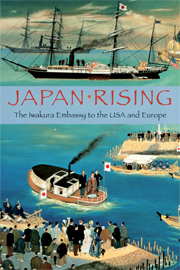Book contents
- Frontmatter
- Contents
- Introduction by Ian Nish
- Note on the Text
- VOLUME I THE UNITED STATES OF AMERICA
- Preface
- 1 The Voyage across the Pacific
- 2 A Survey of the United States of America
- 3 A Record of San Francisco, 1
- 4 A Record of San Francisco, 2
- 5 The Railroad Journey in the State of California
- 6 The Railroad Journey in the State of Nevada and Utah Territory
- 7 The Rocky Mountain Railroad
- 8 The Chicago Railroad
- 9 The Railroad Journey from Chicago to Washington, D.C.
- 10 A Survey of the District of Columbia
- 11 A Record of Washington, D.C., 1
- 12 A Record of Washington, D.C., 2
- 13 A Record of Washington, D.C., 3
- 14 The Journey Through the Northern States, 1
- 15 The Journey Through the Northern States, 2
- 16 The Journey Through the Northern States, 3
- 17 A Record of Washington, D.C.: Epilogue
- 18 A Record of Philadelphia
- 19 A Record of New York City
- 20 A Record of Boston
- VOLUME II BRITAIN
- VOLUME III CONTINENTAL EUROPE, 1
- VOLUME IV CONTINENTAL EUROPE, 2
- VOLUME V CONTINENTAL EUROPE, 3; AND THE VOYAGE HOME
- Index
20 - A Record of Boston
Published online by Cambridge University Press: 04 August 2010
- Frontmatter
- Contents
- Introduction by Ian Nish
- Note on the Text
- VOLUME I THE UNITED STATES OF AMERICA
- Preface
- 1 The Voyage across the Pacific
- 2 A Survey of the United States of America
- 3 A Record of San Francisco, 1
- 4 A Record of San Francisco, 2
- 5 The Railroad Journey in the State of California
- 6 The Railroad Journey in the State of Nevada and Utah Territory
- 7 The Rocky Mountain Railroad
- 8 The Chicago Railroad
- 9 The Railroad Journey from Chicago to Washington, D.C.
- 10 A Survey of the District of Columbia
- 11 A Record of Washington, D.C., 1
- 12 A Record of Washington, D.C., 2
- 13 A Record of Washington, D.C., 3
- 14 The Journey Through the Northern States, 1
- 15 The Journey Through the Northern States, 2
- 16 The Journey Through the Northern States, 3
- 17 A Record of Washington, D.C.: Epilogue
- 18 A Record of Philadelphia
- 19 A Record of New York City
- 20 A Record of Boston
- VOLUME II BRITAIN
- VOLUME III CONTINENTAL EUROPE, 1
- VOLUME IV CONTINENTAL EUROPE, 2
- VOLUME V CONTINENTAL EUROPE, 3; AND THE VOYAGE HOME
- Index
Summary
August 2nd, 1872. Light cloud.
At half past five this morning our steamer arrived at the harbour of Providence in the state of Rhode Island. From here we travelled north by train, arriving at eight o'clock in the morning in Boston, where we took rooms at an old inn [Revere House]. City Hall stands in the centre of the city, but its architecture is not particularly imposing. Boston is an old city. When the colonists rejected British rule, Boston had a population of 2,000 and took the lead in the fight for independence.
At four in the afternoon the city hosted a banquet in our hotel which was attended by 180 people. After dinner there were speeches, and the party ended at ten o'clock. It was the most elaborate dinner we had attended since we left San Francisco.
August 3rd. Cloudy.
At nine o'clock in the morning we set out by train for Lawrence, to the north of Boston, to inspect its cotton mills. American cotton is the finest in the world. The crops are large, and the fibres of the cotton are long and lustrous. Cotton is concentrated in the southern states, while spinning and weaving flourish in the north.
The city of Lawrence, with a population of 28,921, is north of Boston. Thanks to water-power from the Merrimack River, cotton-spinning and weaving mills were built here, and the prosperity of Lawrence soon came to depend on these mills.
- Type
- Chapter
- Information
- Japan RisingThe Iwakura Embassy to the USA and Europe, pp. 102 - 104Publisher: Cambridge University PressPrint publication year: 2009



